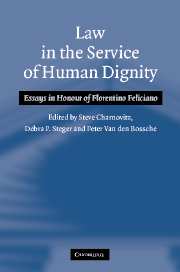Book contents
- Frontmatter
- Contents
- List of contributors
- Preface
- Biographical note
- List of abbreviations
- PART I Reflections on the contributions of Florentino Feliciano to international law
- 1 A judge's judge: Justice Florentino P. Feliciano's philosophy of the judicial function
- 2 The benign first mate
- 3 The Aristotelian
- 4 Trade and economic justice according to law
- PART II Insights into the World Trade Organization
- PART III The changing landscape of investment arbitration
- PART IV New challenges in international adjudication
- Bibliography of works by Florentino Feliciano
- Index
3 - The Aristotelian
from PART I - Reflections on the contributions of Florentino Feliciano to international law
Published online by Cambridge University Press: 29 July 2009
- Frontmatter
- Contents
- List of contributors
- Preface
- Biographical note
- List of abbreviations
- PART I Reflections on the contributions of Florentino Feliciano to international law
- 1 A judge's judge: Justice Florentino P. Feliciano's philosophy of the judicial function
- 2 The benign first mate
- 3 The Aristotelian
- 4 Trade and economic justice according to law
- PART II Insights into the World Trade Organization
- PART III The changing landscape of investment arbitration
- PART IV New challenges in international adjudication
- Bibliography of works by Florentino Feliciano
- Index
Summary
Florentino Feliciano smiles down on me nowadays from the wall of the chambers of the Appellate Body of the World Trade Organization with the same small smile he wore on the day we first met at the WTO all those years ago.
‘Call me Toy’, he said. So I did. We all did.
Everyone everywhere calls him ‘Toy’. Everyone everywhere has always called him ‘Toy’. Florentino Feliciano was one of the most distinguished jurists on the planet long before there was such a thing as an Appellate Body or a WTO, and yet, then as now, far and wide, he has been always simply ‘Toy’.
‘Toy’ is a familiar nickname in the Philippines. For my friend Florentino, it is a nickname he has had since his childhood. This is fitting; for it was in his childhood in the Philippines that the beginnings were made of the great judge that Toy became.
Born in 1928, Toy was thirteen when the Japanese attacked Pearl Harbor. A few weeks later, Japanese forces overran and occupied the Filipino capital of Manila. The occupation forces closed the Catholic school where American Jesuits had been teaching the teenager Toy.
This, however, was not the end of Toy's wartime education. Toy's father, an engineer and geologist who taught at the University of the Philippines for thirty-nine years, had studied in the USA in the 1930s at the University of Chicago.
- Type
- Chapter
- Information
- Law in the Service of Human DignityEssays in Honour of Florentino Feliciano, pp. 14 - 21Publisher: Cambridge University PressPrint publication year: 2005

